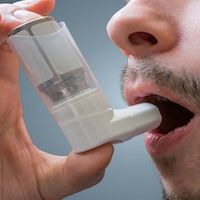African Americans, Hispanics Poorly Represented in Asthma Clinical Trials
Many trials for monoclonal antibody therapies for asthma reported small percentages of African American or Hispanic participants, and some didn’t report racial/ethnic demographics at all.

While African American (AA) and Hispanic patients are disproportionately affected by severe asthma, these patients are poorly represented among participants in clinical trials of monoclonal antibody treatments for asthma, according to a recent study.
The results were presented at the annual meeting of the American College of Asthma, Allergy and Immunology (ACAAI) in Seattle, Washington, by study authors Susamita Kesh, MD, Children’s Mercy Kansas City, and Bridgette Jones, MD, MS, an allergist-immunologist at Children's Mercy Kansas City and associate professor of pediatrics, University of Missouri, Kansas City School of Medicine.
“Racial/ethnic demographic data are reported for the majority of clinical trials of biological therapies to treat asthma,” wrote Kesh and Jones in an abstract. “However, AA and Hispanic participants are poorly represented among these trials.”
Many studies have shown racial or ethnic discrepancies in how asthma affects different populations. One study presented earlier this year showed that African Americans have a 2.5-fold greater chance of developing asthma.
The investigators from Kansas City wanted to identify how many trials for asthma treatments include racial/ethnic data, as well as determine how well represented African American and Hispanic populations were in those studies.
The investigators searched for trials using the terms “asthma,” drug name, and “United States.” The search yielded 29 studies from ClinicalTrials.gov that studied omalizumab, mepolizumab, and reslizumab. Among these, 50% (6 of 12), 100% (11 of 11), and 83% (5 of 6) of studies of omalizumab, mepolizumab, and reslizumab, respectively, reported on the racial/ethnic demographics of participants. Taken all together, just 75.9% (22 of 29) of these studies reported on the racial/ethnic data for their participants.
For the omalizumab trials combined, there were 40.2% African American, 41% Caucasian, and 6.65% Hispanic participants.
The reslizumab trials included a much smaller proportion of African American participants compared to the omalizumab trials but did include slightly more Hispanic patients. These trials included 9.22% African American, 74% Caucasian, and 13.5% Hispanic participants.
Lastly, the mepolizumab trials included the greatest proportion of Caucasian participants and no Hispanic participants. Specifically, these trials included 5.4% African American, 83.9% Caucasian, and 0% Hispanic participants.
The trials also reported a category of “other” racial/ethnic groups that accounted for 12.0%, 10.7%, and 3.3% of the omalizumab, mepolizumab, and reslizumab trial participants, respectively.
“Future trials to establish asthma therapeutic efficacy/ safety for biologic agents to treat severe asthma should be conducted among better representative samples of patients with severe asthma,” wrote Kesh and Jones.
The poster, “Racial/Ethnic Demographics of Participants in Clinical Trials of Biologics Used for Asthma,” was presented at ACAAI on November 17, 2018.